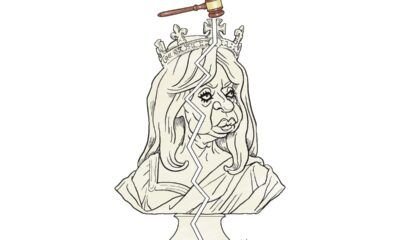INTERNACIONAL
Conservative leader Friedrich Merz secures German government coalition after months of political drift
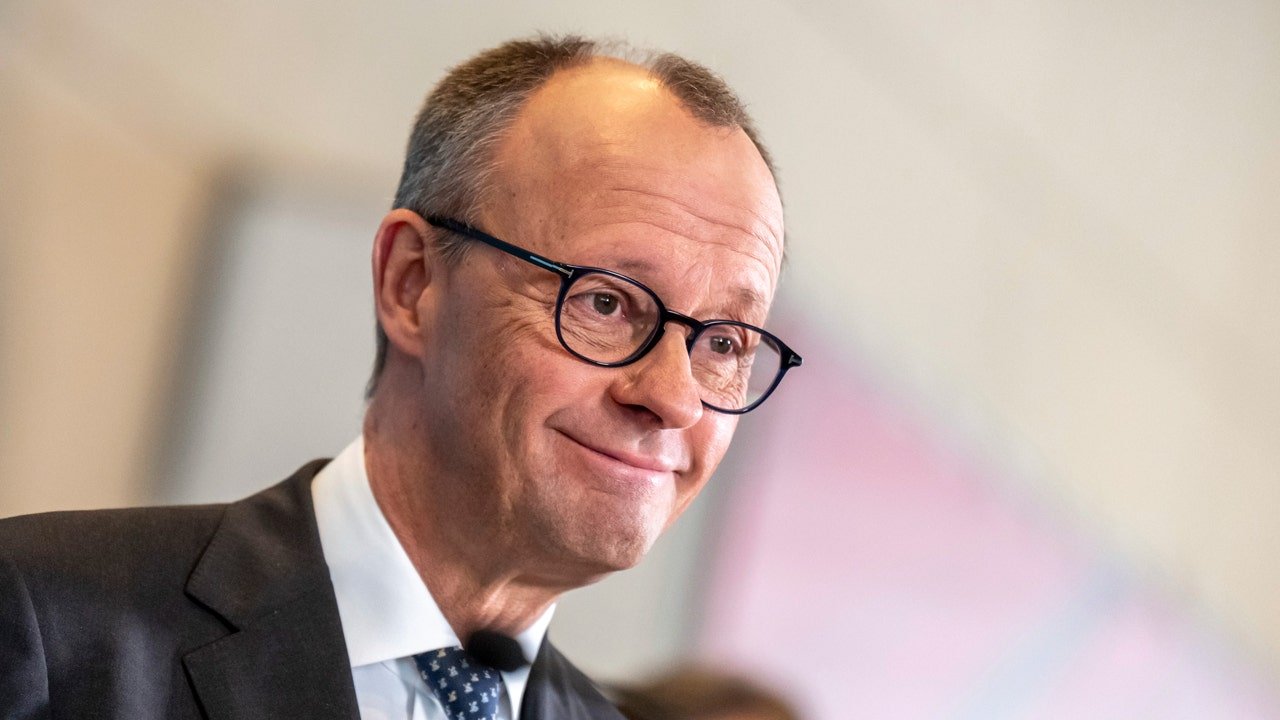
- Friedrich Merz of the CDU is expected to become the next chancellor, replacing Olaf Scholz after Germany’s center-right Christian Democratic Union (CDU) and center-left Social Democrats agreed to form a coalition government.
- The coalition has already advanced plans for increased defense spending and infrastructure investment, marking a shift in CDU’s fiscal stance.
- The deal was hastened by international tensions, including U.S. tariffs and doubts about transatlantic alliances, as well as domestic political pressure from rising far-right support and economic stagnation in Germany.
Conservative and center-left parties reached a deal to form a new German government on Wednesday after weeks of negotiations, paving the way for new leadership in Europe’s biggest economy after months of political drift.
Friedrich Merz, the leader of the center-right Christian Democratic Union, is expected to become Germany’s next leader under the agreement, replacing outgoing Chancellor Olaf Scholz. The parties involved sent an invitation to a news conference on the coalition deal at 3 p.m. (1300 GMT).
Merz’s two-party Union bloc emerged as the strongest force from Germany’s election on Feb. 23. Merz turned to the Social Democrats, Scholz’s center-left party, to put together a coalition with a parliamentary majority.
GERMANY’S CONSERVATIVE ELECTION TURN POINTS TO ‘TRUMP EFFECT INTERNATIONALLY,’ EXPERT SAYS
The wait isn’t quite over yet
It’s still going to be a little while before parliament can elect Merz as chancellor, perhaps in early May. Before that can happen, the coalition deal will need approval in a ballot of the Social Democrats’ membership and by a convention of Merz’s CDU.
Details of the agreement weren’t immediately available.
Friedrich Merz is expected to become Germany’s next leader after the center-right Christian Democratic Union and the center-left Social Democrats reached a deal to form a new German government. (Michael Kappeler/dpa via AP)
But already last month, the two sides pushed plans through parliament to enable higher defense spending by loosening strict rules on incurring debt and to set up a huge infrastructure fund that’s aimed at boosting the stagnant economy.
That was an about-turn for Merz, whose party had spoken out against running up new debt before the election without entirely closing the door to future changes to Germany’s self-imposed «debt brake.»
The election took place seven months earlier than planned after Scholz’s unpopular coalition collapsed in November, three years into a term that was increasingly marred by infighting and widespread discontent. Germany, the 27-nation European Union’s most populous member, has been in political limbo since then.
WORLD LEADERS REACT TO TRUMP’S SWEEPING TARIFFS: ‘TUMULTUOUS TIMES’ AHEAD
Pressure from abroad and at home
The market turbulence caused by U.S. President Donald Trump’s announcement of sweeping tariffs added to pressure for Merz’s Union and the Social Democrats to bring their coalition talks to a conclusion.
The tariffs threaten to add to the woes of an export-heavy economy that shrank for the past two years, and generating growth will be a central task for the new government.
Increasing doubts about U.S. commitment to European allies also played into the prospective coalition’s decision to enable heftier defense spending. Merz said last month that Germany and Europe must quickly strengthen their defense capability and that «‘whatever it takes’ must also go for our defense now.»
CLICK HERE FOR THE FOX NEWS APP
Another factor in the haste to reach an agreement was a decline for the Union in the opinion polls, showing support slipping from its election showing, while the far-right Alternative for Germany, which finished a strong second in February, gained as the political vacuum persisted.
The prospective new coalition brings together what have been post-World War II Germany’s traditional big parties, but the Union’s election-winning performance in February was lackluster and the Social Democrats dropped to their worst postwar showing in a national parliamentary election.
Together, they have 328 seats in the 630-member lower house of parliament, the Bundestag.
INTERNACIONAL
Así es la autocracia
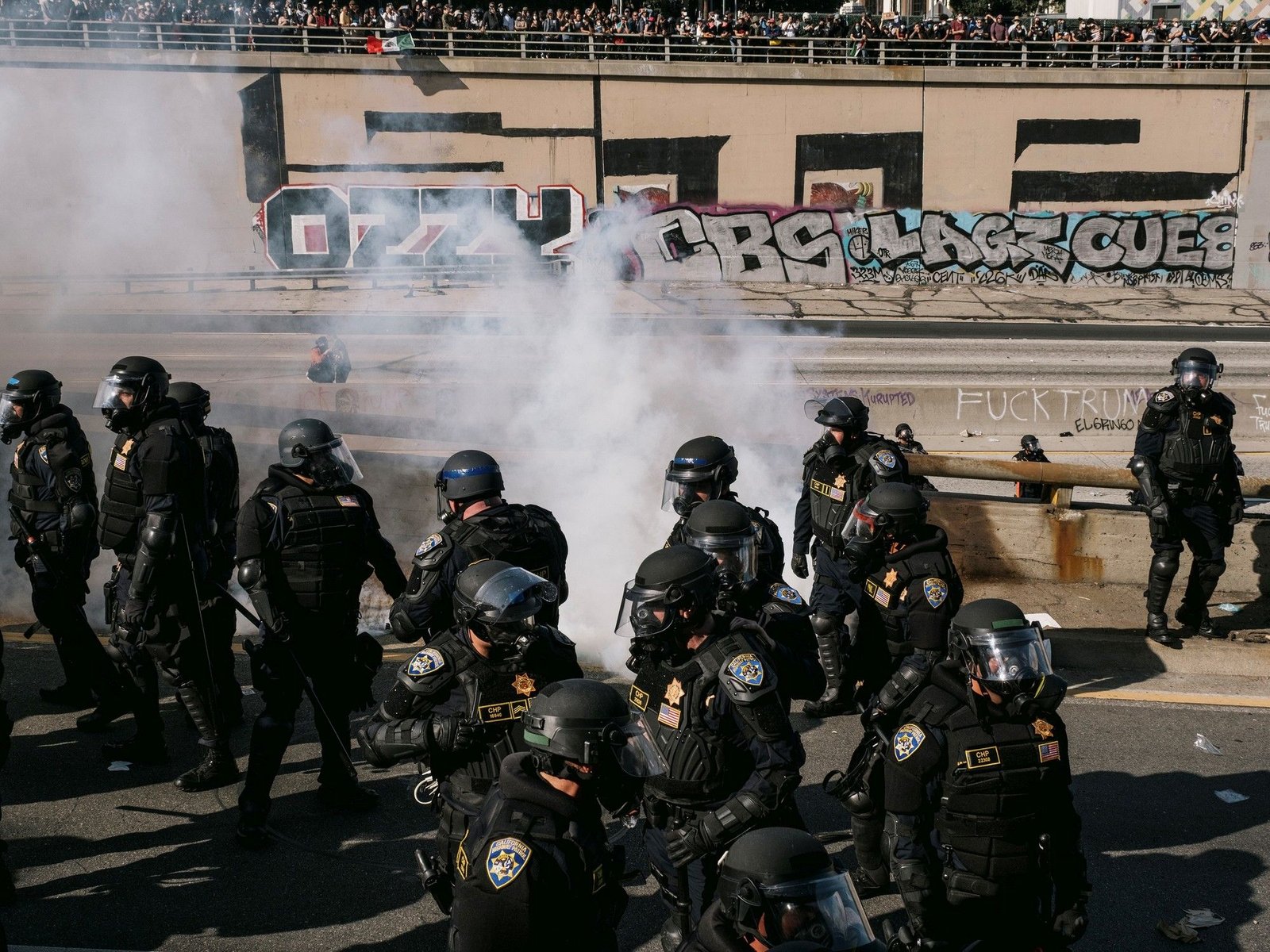
Desde que Donald Trump fue elegido de nuevo, he temido un escenario por encima de todos: que llamara al ejército contra quienes protestaban por sus deportaciones masivas, poniendo a Estados Unidos camino a la ley marcial. Sin embargo, incluso en mis imaginaciones más extravagantes, pensé que necesitaría un pretexto más convincente para desplegar tropas en las calles de una ciudad estadounidense —en contra de la voluntad de su alcalde y gobernador— que las protestas relativamente pequeñas que estallaron en Los Ángeles la semana pasada.
En un entorno posrealista, resulta que el presidente no necesitó esperar una crisis para lanzar una represión autoritaria. En cambio, puede simplemente inventarla.
Es cierto que algunos de los que protestan contra las redadas del Servicio de Inmigración y Control de Aduanas (ICE) en Los Ángeles han sido violentos; el domingo, un hombre fue arrestado por presuntamente lanzar un cóctel molotov a un agente de policía, y otro fue acusado de conducir una motocicleta contra una fila de policías. Dicha violencia debe ser condenada tanto por ser inmoral como por ser tremendamente contraproducente. Cada Waymo quemado o tienda destrozada es un regalo en especie para la administración.
Pero la idea de que Trump necesitaba desplegar soldados en las calles de la ciudad porque los disturbios se estaban descontrolando es pura fantasía.
«Hoy, las manifestaciones en toda la ciudad de Los Ángeles se mantuvieron pacíficas, y felicitamos a todos aquellos que ejercieron sus derechos bajo la Primera Enmienda con responsabilidad», declaró el Departamento de Policía de Los Ángeles el sábado por la noche. Ese mismo día, Trump anuló la decisión del gobernador Gavin Newsom y federalizó la Guardia Nacional de California, amparándose en una ley poco utilizada destinada a lidiar con «la rebelión o el peligro de rebelión contra la autoridad del gobierno de Estados Unidos».
Luego, el lunes, con miles de efectivos de la Guardia Nacional desplegados en la ciudad, el gobierno anunció el envío de 700 marines. La policía de Los Ángeles no parece querer a los marines allí; en un comunicado, el jefe de policía Jim McDonnell declaró: «La llegada de fuerzas militares federales a Los Ángeles, en ausencia de una coordinación clara, representa un importante desafío logístico y operativo para quienes estamos encargados de salvaguardar esta ciudad». Pero para Trump, salvaguardar la ciudad nunca fue el objetivo.
Es importante comprender que, para este gobierno, las protestas no necesitan ser violentas para ser consideradas un levantamiento ilegítimo. El memorando presidencial que llama a la Guardia Nacional se refiere tanto a actos violentos como a cualquier protesta que «inhiba» la aplicación de la ley.
Esta definición parece incluir las manifestaciones pacíficas en torno al lugar de las redadas del ICE. En mayo, por ejemplo, agentes federales armados irrumpieron en dos populares restaurantes italianos en San Diego en busca de trabajadores que se encontraban sin permiso en el país; esposaron a los empleados y detuvieron a cuatro personas. Mientras lo hacían, una multitud indignada se congregó afuera, coreando «¡vergüenza!» e impidiendo la salida de los agentes durante un tiempo. Bajo la orden de Trump, el ejército podría identificar a estas personas como insurrectos.
El gobierno, después de todo, tiene todas las razones para querer intimidar a quienes pudieran participar en la desobediencia civil. Las protestas violentas le hacen el juego; las pacíficas amenazan la narrativa absurda que intenta imponer a Estados Unidos.
Basta con mirar hasta qué punto se está silenciando a David Huerta, presidente del Sindicato Internacional de Empleados de Servicios de California. La semana pasada, Huerta fue arrestado tras sentarse en una acera y bloquear una puerta mientras protestaba contra una redada de inmigración en un centro de trabajo en Los Ángeles. Mientras estaba detenido, fue derribado al suelo, lo que provocó su hospitalización.
El lunes, el Departamento de Justicia lo acusó de «conspiración para obstaculizar a un oficial», un delito grave que conlleva una pena máxima de seis años de prisión.
Trump también exigió el lunes el arresto de Newsom. Si viéramos todo esto en cualquier otro país —soldados enviados para reprimir la disidencia, líderes sindicales arrestados, políticos de la oposición amenazados—, sería evidente que la autocracia ha llegado. La pregunta ahora es si los estadounidenses que odian la tiranía podrán reaccionar.
Muchos han especulado que la confrontación en Los Ángeles le hará el juego a Trump, permitiéndole presentarse como un defensor de la ley y el orden que somete a las bandas criminales. Quizás tengan razón; Trump es un maestro de la demagogia con un don para crear las escenas de conflicto que sus partidarios anhelan. Ahora sabemos que el Dr. Phil (n. de la r.: personalidad televisiva de Estados Unidos) estuvo sobre el terreno con el ICE durante las redadas que desencadenaron los disturbios en Los Ángeles, grabando un especial en horario de máxima audiencia. La administración parecía querer un espectáculo.
Sin embargo, la opinión pública no es inamovible, por lo que es importante que todos los que tienen una plataforma —políticos, veteranos, líderes culturales y religiosos— denuncien los excesos autoritarios de la administración.
Funcionarios de la administración como Stephen Miller promueven la idea de que Los Ángeles es «territorio ocupado», como lo demuestran las banderas extranjeras que portan algunos manifestantes. Los estadounidenses que aún albergan esperanzas democráticas deberían decir, tan alto y con tanta frecuencia como puedan, que esta es una mentira insultantemente estúpida para justificar una toma de poder dictatorial. Quizás resulte que la verdad no sea rival para la propaganda de la derecha, pero si ese es el caso, ya estábamos perdidos.
c.2025 The New York Times Company
INTERNACIONAL
Newsom addresses Trump’s threat to arrest him as the two spar over LA riot response: ‘Point of no return’
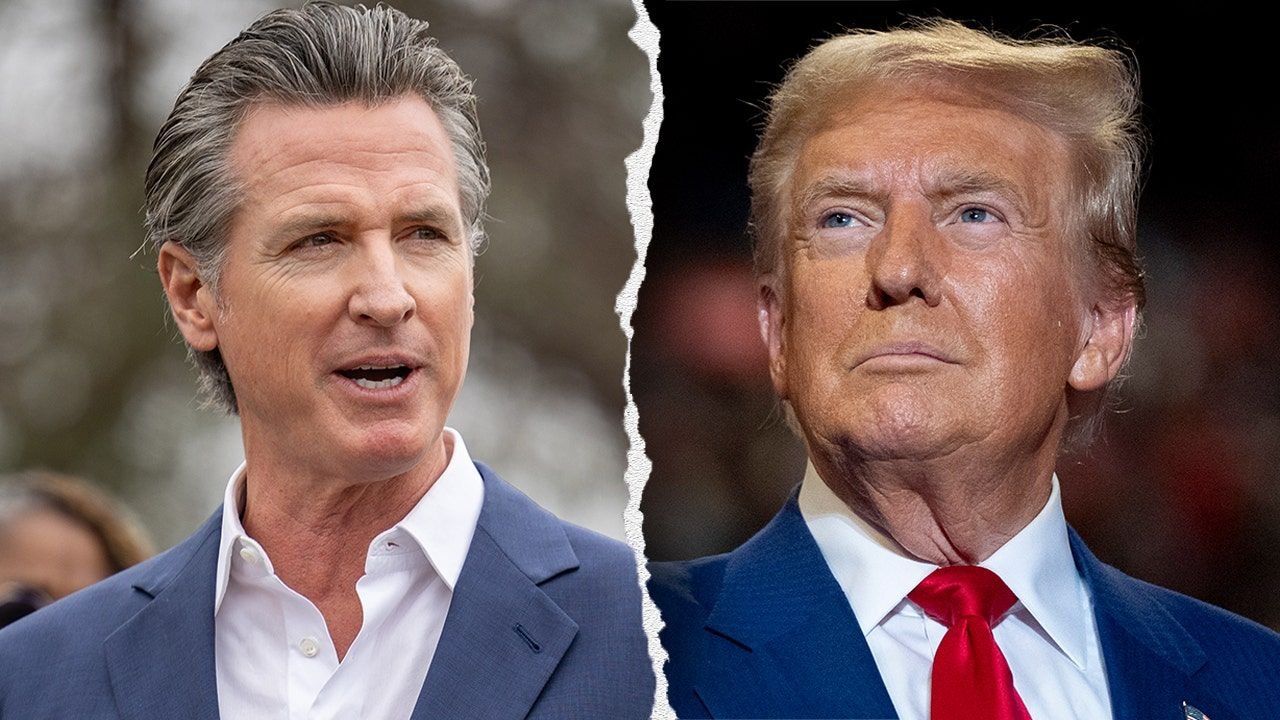
NEWYou can now listen to Fox News articles!
California Gov. Gavin Newsom, a Democrat, said he has crafted a plan in the event the Trump administration arrests him after he and President Donald Trump went head-to-head over the handling of the immigration protests in Los Angeles.
Newsom said he and his team have «processed» what it would mean for him if the Trump administration secured a federal warrant for his arrest, Newsom said in an interview with the «Pod Save America» podcast hosted by former Obama administration officials that aired Monday night.
«What’s so absurd about that question is I’ve actually thought about it,» Newsom said when asked about preparations in the event authorities take him into custody.
«The fact that we are even having that conversation with our folks, and have had that conversation with our folks in the United States in 2025, I mean, it says everything you need to know about who’s in the White House right now,» Newsom said.
TRUMP GIVES BLUNT RESPONSE TO NEWSOM DARING HOMAN TO ARREST HIM: ‘I WOULD’
Newsom also addressed the arrest threats in an interview with The Washington Post published Tuesday, signaling that the relationship between the two had reached a point beyond repair.
«He just threatened my arrest. One would assume, or presume, that’s the point of no return,» Newsom told The Washington Post. «I’m constitutionally capable of working with people, even those that call for my arrest. So, I remain resolved in that respect, as I remain resolved to have the backs of kids whose lives are being threatened by his authoritarian tendencies.»
President Donald Trump and first lady Melania Trump walk with California Gov. Gavin Newsom after arriving on Air Force One at Los Angeles International Airport Jan. 24, 2025. (Mark Schiefelbein/AP)
Trump’s border czar, Tom Homan, first suggested in an interview with NBC News Saturday that Newsom and Los Angeles Mayor Karen Bass could face arrest if they hamper any federal efforts to deport illegal immigrants.
In response, Newsom appeared to taunt Homan to take him into custody.
«He’s a tough guy. Why doesn’t he do that? He knows where to find me,» Newsom told MSNBC News Sunday. «That kind of bloviating is exhausting. So, Tom, arrest me. Let’s go.»
When asked about threats to arrest Newsom, Trump told reporters Monday that Newsom’s primary crime «is running for governor because he’s done such a bad job,» adding he would arrest Newsom if he were Homan.
Newsom voiced disappointment in response to Trump’s remarks and cautioned the threats amounted to a step toward authoritarianism.
NATIONAL GUARD TO BE DEPLOYED IN LOS ANGELES COUNTY AS ANTI-ICE PROTESTS RAGE: BORDER CZAR TOM HOMAN
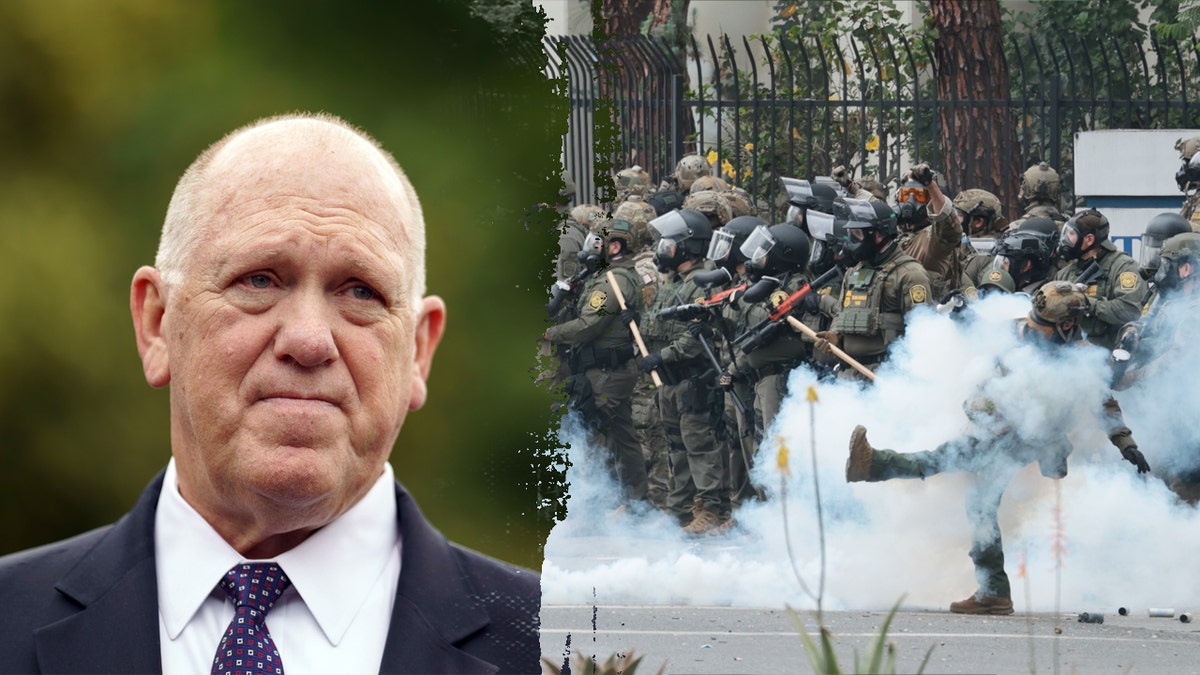
U.S. border czar Tom Homan responded to the ICE riots in LA during a recent appearance on MSNBC. (Getty Images)
«The President of the United States just called for the arrest of a sitting Governor,» Newsom said Monday in a post on X. «This is a day I hoped I would never see in America. I don’t care if you’re a Democrat or a Republican this is a line we cannot cross as a nation — this is an unmistakable step toward authoritarianism.»
Meanwhile, Homan appeared to soften his original statement, saying an arrest would only happen if a crime were committed by Newsom and Bass.
«Well, that whole thing’s been taken out of context,» Homan said. «They haven’t crossed a line yet, but like any other U.S. citizen, if you cross that line, I don’t care who they are. The governor, the mayor, whatever — when you commit a crime against ICE officers, we will seek prosecution.»
Newsom, who was first elected governor in 2018 and was re-elected in 2022, has drawn the ire of Trump for how he’s handled multiple issues in his state, including the wildfires that ravaged Los Angeles in January.
FEDERAL OFFICIALS SLAM DEMOCRATS FOR ‘DANGEROUS’ RHETORIC AS ICE AGENTS FACE VIOLENT MOBS IN LA, NYC

California Gov. Gavin Newsom and President Donald Trump meet in January during the wildfires in Los Angeles. (Pool)
The two have sparred over Trump’s decision to deploy thousands of National Guard troops and 700 Marines to California after protests launched Friday in response to recent arrests in the city by U.S. Immigration and Customs Enforcement.
While Trump has argued the National Guard troops are necessary to prevent destruction in Los Angeles, Newsom has said the deployment violated California’s state sovereignty. State governors usually oversee National Guard troops, but Trump invoked a law to place the troops under federal command so he could circumvent Newsom.
On Monday, Newsom said most of the troops «are sitting, unused, in federal buildings without orders.»
«This isn’t about public safety,» Newsom said in a Monday post on X. «It’s about stroking a dangerous President’s ego.»
The Associated Press contributed to this report.
INTERNACIONAL
Una solución equilibrada al debate sobre el ‘zero rating’ en Colombia

(Imagen Ilustrativa Infobae)
En los últimos días, el fallo de la Corte Constitucional sobre la práctica del zero rating en los planes de telefonía móvil ha generado un intenso debate. Esta decisión, que prohíbe a los operadores ofrecer acceso gratuito y exclusivo a ciertas aplicaciones como WhatsApp o Facebook, busca, según la corte, proteger la neutralidad de la red, un principio que garantiza que todos los contenidos en internet sean tratados por igual. Sin embargo, el tema no es tan sencillo como parece, y su análisis no puede ser generalizado.
Como ciudadanos, necesitamos entender el fallo de manera clara y reflexionar sobre cómo abordarlo sin perjudicar a los usuarios, especialmente a los más vulnerables. Mi propuesta es simple: en lugar de implementar medidas generales que afectan a todos por igual, las restricciones deben aplicarse caso por caso, solo cuando se demuestre una distorsión en el mercado móvil o un abuso de la posición del mercado de un operador de ese servicio. En ese entendido, deben ser los organismos reguladores los llamados a aplicar las medidas del caso que deben ser proporcionales y temporales mientras se corrigen las fallas del mercado.
La Corte, en su sentencia del 30 de mayo de 2025, declaró inconstitucional una parte del artículo 56 de la Ley 1450 de 2011, que permitía a los operadores de telefonía móvil ofrecer planes donde ciertas aplicaciones no consumen datos del usuario. Esta práctica, conocida como zero rating, fue cuestionada porque, según los demandantes, viola la neutralidad de la red.
¿Qué significa esto? Que los operadores no deben decidir qué aplicaciones o servicios tienen prioridad en internet, ya que todos los contenidos deben estar disponibles en igualdad de condiciones. La Corte dio un año a las empresas para ajustar sus planes, asegurando que cualquier beneficio de datos gratis se ofrezca de manera neutral, sin privilegiar aplicaciones específicas.
El fallo responde a una preocupación válida: cuando un operador decide qué aplicaciones son gratuitas, puede limitar la libertad de los usuarios para elegir qué consumir en internet. Por ejemplo, si WhatsApp no consume datos, pero una aplicación local de mensajería sí, los usuarios podrían verse empujados a usar solo WhatsApp, afectando la competencia y la diversidad de opciones.
Sin embargo, el zero rating también ha permitido que millones de colombianos, especialmente en zonas rurales o de bajos ingresos, accedan a aplicaciones esenciales sin gastar su saldo.
Este es el dilema: ¿cómo protegemos la neutralidad sin sacrificar el acceso a internet de los más necesitados?
El fallo de la Corte es un paso importante para defender los derechos digitales, pero plantea un desafío: no todas las prácticas de zero rating son abusivas ni restrictivas del mercado móvil. Por eso, creo que no podemos analizar este tema de manera general, aplicando una misma regla para todos los casos. Una medida que prohíbe el zero rating sin distinguir entre situaciones específicas puede tener consecuencias no deseadas, como encarecer el acceso a internet para quienes dependen de estos planes, que en Colombia representan el 76% de los usuarios móviles.
Estos temas no deben ser tratados en fallos judiciales. La constitución y la ley en nuestro país, ha creado organismos modernos que toman decisiones técnicas que son los llamados manifestarse. La Comisión de Regulación de Comunicaciones (CRC), como ente regulador, debe evaluar si un operador está abusando del mercado al ofrecer ciertas aplicaciones gratis. Por ejemplo, si una empresa favorece a una red social en detrimento de otras para obtener beneficios económicos o limitar la competencia, entonces sí debe intervenirse. Pero si el zero rating se usa para facilitar el acceso a internet sin dañar el mercado, no debería prohibirse de manera automática. Una regulación inteligente debe medir el impacto real de cada práctica antes de restringirla.
El fallo de la Corte Constitucional nos invita a reflexionar sobre cómo construir una internet más justa y accesible en Colombia. Pero las soluciones no pueden ser de talla única. Prohibir prácticas como el zero rating sin analizar cada caso puede generar más problemas que beneficios, especialmente para quienes dependen de estos planes para estar conectados. Invito a los operadores, al gobierno, a la sociedad civil y a los ciudadanos a dialogar sobre cómo garantizar la neutralidad de la red sin dejar atrás a los más vulnerables.
Hagamos de esta discusión una oportunidad para fortalecer el acceso a internet como un derecho, no como un privilegio. Porque en un mundo cada vez más digital, estar conectados no es un lujo, es una necesidad.
Ahora, en el entendido de que el internet en nuestro país es un servicio público esencial que además, la red que lo soporta fue declarada de utilidad pública e interés social gracias a la ley 2416 de mi autoría, es absolutamente claro que quien tiene la obligación de que el servicio llegue a todas partes y su acceso sea igual para todos los colombianos es el Estado.
Por tal razón, mi propuesta es que, de la misma manera que es subsidiado el servicio de energía y el servicio de agua potable a los sectores más vulnerables, también se destinen recursos para subsidiar paquetes básicos que permitan a esta población acceder a internet. Esta sería una medida que nos permitirá avanzar en la inclusión digital y en la igualdad de derechos de todos en el ciber espacio.
Medidas como estas, sumadas a un ambicioso plan de digitalización de Estado y nuestra economía, ayudarían mucho a que podamos montarlos en la ola de la cuarta revolución industrial, marcada por el desarrollo de la inteligencia artificial, la cual lidera las tasas de crecimiento de las economías más fuertes del mundo.
De esta manera, en lugar de centrarnos en prohibiciones, transformaríamos el debate en una oportunidad para democratizar el acceso a internet para todos.
-

 POLITICA1 día ago
POLITICA1 día agoCristina Kirchner habla en sede del PJ a la espera de la decisión de la Corte Suprema por la causa Vialidad
-
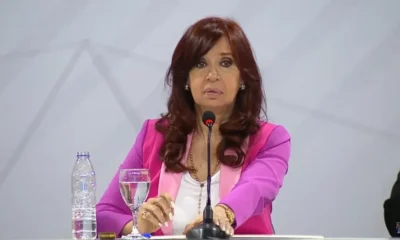
 POLITICA9 horas ago
POLITICA9 horas agoCristina Kirchner fue condenada a seis años de prisión e inhabilitación perpetua para ejercer cargos públicos
-

 POLITICA2 días ago
POLITICA2 días agoAnte la posible condena de la Corte contra CFK, dirigentes kirchneristas convocaron a una reunión urgente














